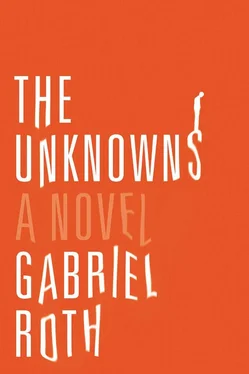She was facing the opposite direction from me now, with the chains of her swing twisted around one another. A couple of stray curls had fallen over her face, and through them she surveyed the monkey bars and the seesaw as though from a great and tragic distance.
“And so now whenever they see me, they just start laughing,” she said. “In social studies they passed me a note with a picture on it — it was horrible.”
I was slightly shocked at the mature themes that had entered our conversation. I didn’t know how a girl might “do it” with a plastic toy, although if pushed I would have guessed that it had something to do with inserting it in her vagina. And I was still reeling from the revelation about Leo Garson, who was in my homeroom and was known for doing a retarded character he called Special Ross. I hadn’t expected Tara to tell me she loved me, but I’d hoped I was at least sufficiently on the map that she wouldn’t casually tell me she loved someone else.
“They sound terrible,” I said.
“They are terrible,” she said. “They’re so mean.”
“So why would you want to be friends with them?”
She looked at me with pity. “Everyone wants to be friends with them,” she said.
“I don’t want to be friends with them,” I said with total sincerity. The cryptic remarks about the My Little Pony had frightened me.
“That’s fine for you,” she said sadly. “You’ve got… you’ve got your own stuff going on.” What stuff was she referring to? “But I’m not like that. I wish I could just be like, Oh, whatever, Michelle, if you’re going to be friends with Louise then I can’t be friends with you . But, you know, if I tried to be all tough like that, she wouldn’t care, she’d just be like, OK, fine, whatever . I mean, what am I going to do, be friends with Cheryl Palatino and Emma Price again? I can always be friends with them, they’ll be friends with anyone. But I don’t want to hang out with them. Why would I want to hang out with them? So I’m going to hang out with nobody.” A look of resignation came over her face. It seemed sad, the idea that if Michelle Kessel wasn’t going to be your friend there was no one else in the world.
“I should get back,” she said suddenly. “I’m supposed to be in yearbook right now.”
We began walking back toward school. “You’re really special, you know that?” she said. “You’re a really good listener. You’re a really good person.”
“Thanks,” I said, and I felt like I might be about to sprout wings and soar above the school, up over Denver and into the mountains. And then we were at the corner of the parking lot behind the school building, and Tara headed off across the lot along the diagonal. I watched her heading for the building’s rear door, occasionally raising her hand to wave at a carful of departing kids. I kept walking straight on Randall, alongside the parking lot, beside the school building, and toward the front steps, where my mother had been waiting for half an hour.
“I have no idea what you’re thinking” was what she said when I climbed into the car. “Where the hell have you been?”
“I was talking to a friend,” I said, feeling somehow self-righteous. “I was talking to a girl who was really upset, and she needed to talk to me.” This seemed like a valid justification.
My mom let out a long sigh as she turned the key in the ignition, and I had the feeling that she would have been angrier if she hadn’t been so tired. We drove home in silence. When we got home I went straight into my room and took out my notebook. On Tara’s page I wrote, Beautiful and deep. Truly a good person. Likes LG — serious? Too sensitive for the everyday social world — wants to make a deeper connection . Under Michelle’s name, where it said Lots of makeup and Popular , I added User . Under Louise’s I wrote Mean .
During most classes I split my brain in two: half of me tracked the material being covered while the other half revised and expanded my girl database. The exception was Combined Math, a two-semester dash through geometry, trig, and algebra designed for math-adept freshmen. Only two of the girls in the class were listed in my notebook, and the content consumed all of my attention. The teacher, Mr. Gestetner, was a rumpled man with a genius for exposition: you left his class palpably smarter than you were before. Kids like teachers who are good at teaching, but teaching is difficult, so a lot of teachers settle for being friendly.
Gestetner assigned quizzes every few weeks, with extra homework for anyone who performed unsatisfactorily. We were leaving the classroom after one such quiz when I heard Graham Neale’s voice behind me. Graham was the boy from my homeroom with the split-level haircut. In math he sat in the back and didn’t volunteer, although when Gestetner called on him he always produced the correct answer with no evident struggle.
“That was brutal,” he said over my shoulder.
“Yeah,” I said, slowing to fall in with him. In fact I had enjoyed it.
“The number of quizzes in this class is a fucking joke,” Graham said, coming down on the penultimate word with savage relish.
“I know,” I said. “It sucks.” I was trying to use words like sucks more. And then I heard a croaking voice calling my name, and Bill Fleig was hurrying out of the classroom after us. From a distance of more than ten years, I can see how he recognized me as a kindred spirit: my dull wardrobe; my habitual look of beatific concentration; my unfortunate haircut, which swooped out from my ears in smooth shallow curves describable by quadratic equations. But at the time it felt like he had arbitrarily chosen to mark me by association.
“Do you know Pascal?” he asked. He had a way of jumping straight to the substance of conversations, treating greetings and pleasantries as noise.
“Nuh-uh,” I said as Graham looked on.
“I was talking to Mr. Gestetner,” Bill said. “He says he’ll teach Pascal classes after school if I can find one other person who wants to do it.”
This proposal was not without its appeal. I was frustrated with the limitations of BASIC and eager to become a more sophisticated programmer. But allying myself with Bill, or publicly expressing an interest in computers, would be a catastrophic error.
“Pascal is retarded,” I said, proud to be disowning my nerd impulses. And then Graham gave me a quizzical look and I realized my mistake: I should have said, What the fuck is Pascal ? Instead I had outed myself as someone who had opinions about programming languages.
“So does that mean you won’t do it?” Bill asked. “Because if I can’t find someone else, Gestetner won’t teach the class.” Graham was heading off toward his locker.
“Well, boo hoo,” I said, and turned my back on Bill Fleig. Feeling defeated, I grabbed my coat and books and made my way out of the building to the school’s front steps where my mom would pick me up. Plastic bags and sheets of loose-leaf paper soared and sank in the wind. I waited on the bottom step, at the far left, where my mom always looked for me, and watching the cars I realized: they were all driven by other students. That’s when my mom’s pale blue Nissan pulled up, and she leaned over the passenger side and waved, and there I was, the only kid at my high school getting picked up by his mom. As I got in, it was as if some adult version of me, someone capable and self-reliant, was watching and protesting: That’s just a kid! That little kid is going around pretending to be me !
When I started at MLK Mom had, temporarily and with great bureaucratic effort, adjusted her schedule at the doctor’s office where she worked reception. We’d anticipated that I would meet other kids who lived in Sheridan and my mom would arrange a car pool with their parents. But I had not yet met any such kids, and if I had I don’t think I could have said, Hey — you live in Sheridan? We should carpool ! Most of the older kids drove or got rides with friends; the younger ones took the municipal bus. But then, most of the kids at MLK didn’t live in Sheridan, off the city bus routes.
Читать дальше












